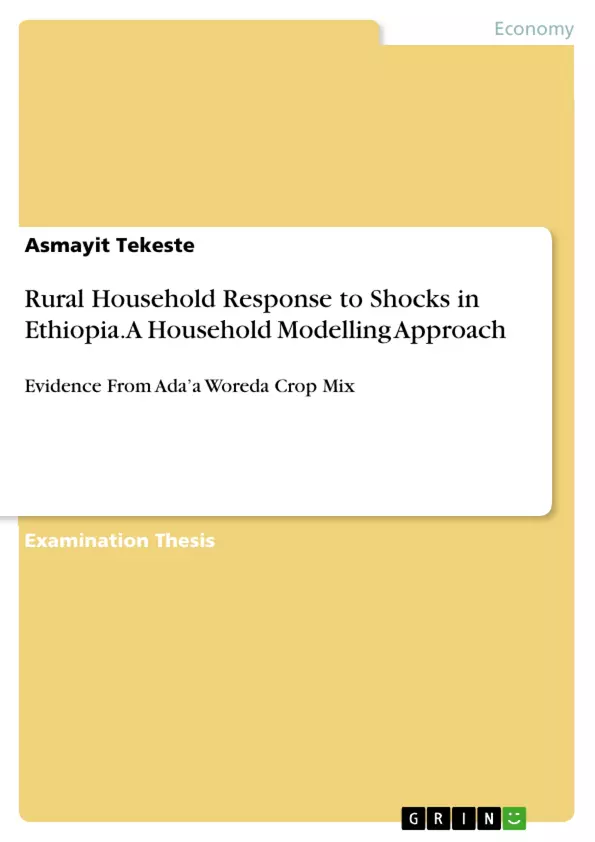This study assesses the response of rural households to output and input prices as well as technological changes in mixed crop production in Ethiopia, in case of Ada’a woreda selecting a sample size of 100 households using a non separable household modeling approach. Cobb Douglas function is used for the production and utility function and major constraints like land, labor, seed and fertilizer are considered in order to find the optimum values that would enable household maximize their utility. The most widely produced 7 crops in the village were selected. The optimal value exposes that mono cropping is better than multiple cropping to maximize utility. Output price, factor price and technology shocks were introduced in order to see how the households respond and how and to what extent that the production, consumption and welfare of households are changed. The finding of the study reveals that households tend to leave the agricultural sector if all input prices are increased by 10% and this is the case where the households face minimum welfare level. When output prices are increased by the same figure, farmers allocate all of their labor in the agricultural sector. A technological improvement by 20% on teff enables households to fully engage in agricultural activities and secure the highest utility compared to other shocks while other crops are not responsive to technological change. This implies that stakeholders should focus to improve the method of production of teff in the village. In addition, the government should get involved in such a way that factor prices shouldn't be increased beyond a certain point.
Ethiopia has experienced three main political regime changes in the last five decades along with an unremitting political instability and war. In the imperial regime, a mixture of feudalism and capitalism was the main framework of the economy. The government also attempted to implement successive five year planning that heavily engaged in industrialization. However, they failed to achieve what is expected due to the fact that agriculture received less attention. Amidst this performance, the socialist government seized power and nationalized all the emerging private industries. The government firmly controlled all economic activities and marginalized private investors from main activities.
Inhaltsverzeichnis (Table of Contents)
- CHAPTER ONE: INTRODUCTION
- 1.1. Background
- 1.2 Problem Statement
- 1.3. Objectives of the Study
- 1.4. Research Questions
- 1.5. Significance
- 1.6. Scope of the study
- 1.7. organization of the study
- CHAPTER TWO: LITERATURE REVIEW
- 2.1. Conceptual Discussion and Definitions
- 2.2. Theoretical literature review
- 2.2.1. Household Models
- 2.2.2. Agricultural Household Models
Zielsetzung und Themenschwerpunkte (Objectives and Key Themes)
This study aims to investigate the impact of crop mix and rural household response to shocks in Ethiopia, specifically focusing on Ada'a Woreda. The research utilizes a household modeling approach to analyze the determinants of crop diversification and household resilience in the face of various shocks.
- Crop mix and diversification strategies in rural Ethiopia
- Household response to shocks and resilience building
- Impact of shocks on agricultural production and household welfare
- Determinants of crop choice and diversification patterns
- Household modeling and its application in understanding rural dynamics
Zusammenfassung der Kapitel (Chapter Summaries)
Chapter One provides an overview of the study's background, problem statement, objectives, research questions, significance, scope, and organization. It lays the foundation for understanding the research context and rationale.
Chapter Two delves into the relevant theoretical literature, examining conceptual definitions and theoretical frameworks related to household models and agricultural household models. This chapter provides a comprehensive review of existing literature on the topic.
Schlüsselwörter (Keywords)
The main keywords and focus topics of this thesis include: crop mix, rural households, shocks, resilience, household modeling, agricultural household models, Ethiopia, Ada'a Woreda, diversification, welfare, determinants of crop choice.
Frequently Asked Questions
How do rural Ethiopian households respond to price shocks?
The study shows that if input prices increase by 10%, households tend to leave the agricultural sector, leading to minimum welfare levels.
What is the impact of technological improvement on Teff production?
A 20% technological improvement in Teff enables households to fully engage in agriculture and achieve the highest utility compared to other shocks.
Is mono-cropping better than multiple cropping in Ethiopia?
According to the household modeling approach used in this study, mono-cropping was found to be more effective for maximizing household utility in the Ada’a woreda.
How does an increase in output prices affect labor allocation?
When output prices increase by 10%, farmers tend to allocate all of their labor to the agricultural sector to maximize gains.
What methodology was used in this study?
The research utilized a non-separable household modeling approach with a Cobb-Douglas function for production and utility analysis.
- Quote paper
- Asmayit Tekeste (Author), 2016, Rural Household Response to Shocks in Ethiopia. A Household Modelling Approach, Munich, GRIN Verlag, https://www.grin.com/document/442427



